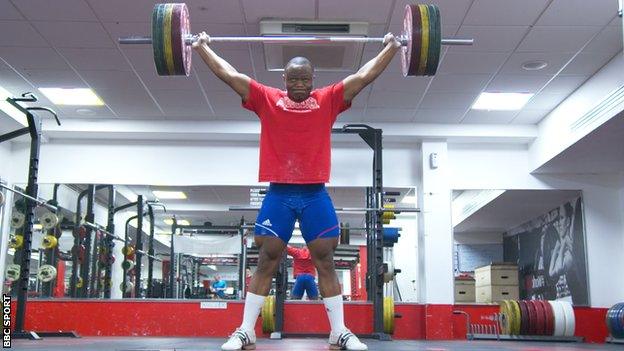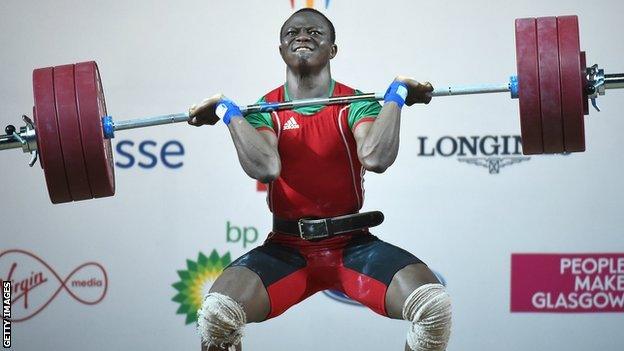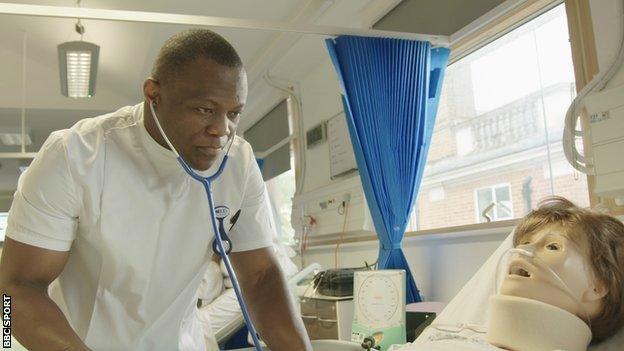Cyrille Tchatchet II: From homeless and 'suicidal' to Olympic hopeful
- Published

Cyrille Tchatchet II is aiming to compete at the 2020 Olympics in Tokyo
Weightlifter Cyrille Tchatchet II competed for Cameroon at the 2014 Commonwealth Games in Glasgow but was afraid to return to his homeland. After fleeing the team base he ended up sleeping rough in Brighton. The 23-year-old says he contemplated suicide at his lowest moment but has rebuilt his life since being granted asylum and is now proudly preparing to represent the Refugee Team at the 2020 Olympics in Tokyo. This is his story...
"I'd thought about suicide for a long time. I just wanted to end it all."
Cyrille Tchatchet II had reached his lowest moment.
He had been rough sleeping for over two months and had finally run out of money, unable to buy food or water.
"It got to the point where I thought 'why am I even doing this? Why am I wasting time? Just kill yourself'," he says.
"I was living under a bridge in a new city in a new country. I knew nobody.
"You just feel ashamed and that you're nothing. You feel suicidal all the time because you just think you're useless."
Tchatchet found himself destitute in Brighton in 2014 having travelled from Glasgow.
Then, aged 19, he had competed for his native Cameroon at the Commonwealth Games and had come fifth in the men's 85kg weightlifting event.
However, it was an experience he said he could not enjoy as he felt he was unable to return to his homeland - he still feels he cannot discuss the reasons.

Tchatchet finished fifth at the 2014 Commonwealth Games while representing Cameroon
Now 23, Tchatchet has leave to remain in the UK until 2021, having successfully applied for asylum.
He refers to his lowest ebb in Brighton - contemplating suicide - as also a "positive" turning point as it was then that he sought help.
"Next to me I saw a number of the Samaritans," he explains.
"It said if you're feeling low just call this number. I had some credit in my phone so I called them.
"They asked me where I am and I think they're the ones who called the police because then I saw the police car coming. The good thing is they stopped me."
It was when Tchatchet was taken into police custody that his asylum case was put in motion.
However, it was not until almost two years later that his leave to remain was granted.
By that time he had been rehoused in Birmingham via a spell in an immigration removal centre in Dover.
Throughout, his mental health suffered.
"I used to see my GP, who was quite supportive and prescribed me antidepressants," Tchatchet says.
"They were advising to get into exercise more and keep myself busy - and luckily I was into weightlifting."
Tchatchet joined weightlifting clubs in Birmingham and before long he was back competing - first at regional level, then at British championships as a UK resident.
He has since gone on to become British champion at 94kg and 96kg as well as break several national records., external
Word of Tchatchet's talent reached the International Olympic Committee, which has recently begun to fund him with $1,500 a month (£1,180) towards the goal of representing the Refugee Team at next year's Tokyo Olympics.
"I would be really proud to represent the 68.5 million displaced people around the world," he says, adding that he can hold his own with the world's best.
But for Tchatchet, striving to become an Olympian is only part of his focus.
All of his experiences since Glasgow 2014 have led him to following a vocation as a mental health nurse, helping people with diverse conditions such as depression, schizophrenia and personality disorders.
He is due to complete those studies at Middlesex University this year.

Cyrille is training to become a mental health nurse to 'give something back' in recognition of the support he received while suffering depression
"When my asylum case was granted I really wanted to get back into education," Tchatchet says.
"I had started studying geography in 2013 in Yaounde and had to give up.
"The main reason I got into nursing here was because I experienced depression, and I wanted to give back some of the support I had received from the nurses and my GP.
"Everything is just linked to me studying for nursing."
From being homeless, hopeless and suicidal, Tchatchet has discovered a new direction in life.
But, despite the exciting possibilities that a new career and Olympic inclusion provide, it is simpler pleasures he cherishes most.
"I'm pretty happy at the moment," he says.
"I go to university. I'm able to train. I've got a room. I've got a roof. I have enough food to eat. I feel safe.
"I'm quite thankful for that now."